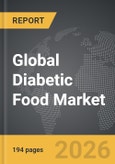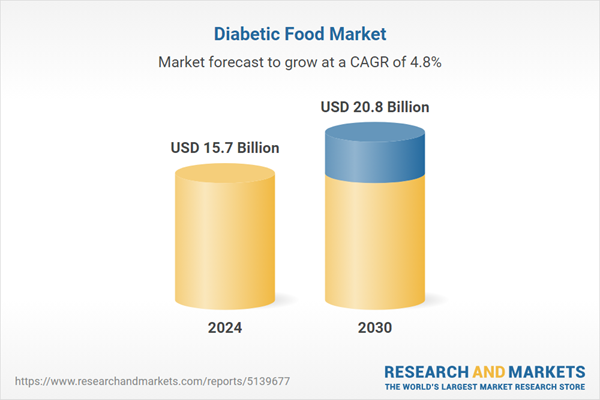Global Diabetic Food Market - Key Trends and Drivers Summarized
What Makes Diabetic Food Essential in Managing Blood Sugar Levels?
Diabetic food products cater specifically to individuals with diabetes, offering options that help manage blood sugar levels while providing balanced nutrition. These products are carefully formulated to control carbohydrates, sugars, and fats, which are crucial factors in maintaining stable glucose levels. Diabetic-friendly foods often use low-glycemic index ingredients that release glucose into the bloodstream more slowly, preventing spikes in blood sugar after meals. They also emphasize high fiber content, which aids in digestion and helps regulate blood sugar levels over time. Furthermore, these foods typically reduce sodium content to support heart health, as individuals with diabetes are at higher risk of cardiovascular complications. By addressing these dietary concerns, diabetic food plays a vital role in promoting overall health and wellness for those managing diabetes.How Are Innovations in Diabetic Food Catering to Diverse Dietary Needs?
Advancements in food science have led to innovations in diabetic food options that go beyond basic nutritional management. Modern diabetic foods encompass a wide range of choices, from sugar-free snacks and desserts to ready-to-eat meals that meet specific dietary requirements. Sweeteners like stevia and erythritol, which have minimal impact on blood glucose levels, are commonly used in place of sugar to create diabetic-friendly treats. Moreover, there is a growing market for gluten-free and lactose-free diabetic products, accommodating individuals with additional dietary restrictions or intolerances. The use of natural ingredients and the elimination of artificial additives further enhance the appeal of these products, aligning with consumer preferences for healthier food choices. As demand for convenient and nutritious options continues to rise, manufacturers are innovating to deliver diabetic foods that are both satisfying and supportive of a balanced lifestyle.What Role Does Consumer Education Play in the Adoption of Diabetic Food?
Consumer education plays a pivotal role in driving the adoption of diabetic food products. As awareness of diabetes-related dietary management increases, individuals are seeking information on how specific foods impact blood sugar levels and overall health. Educating consumers about the benefits of diabetic foods, such as their ability to prevent blood sugar spikes and support weight management, empowers them to make informed choices that align with their health goals. Additionally, healthcare professionals play a crucial role in recommending suitable diabetic food options based on individual health profiles and dietary needs. This collaborative approach between consumers and healthcare providers fosters a supportive environment for adopting healthier eating habits and managing diabetes effectively through diet.What Drives the Growing Market for Diabetic Food Products?
The growth in the diabetic food market is driven by several factors, including the increasing prevalence of diabetes globally, rising awareness of health and wellness, and the growing demand for convenient, ready-to-eat options. With diabetes rates on the rise due to factors such as sedentary lifestyles and poor dietary habits, there is a heightened need for dietary solutions that support blood sugar management. The expansion of diabetic food offerings to include a broader range of flavors and textures also appeals to consumers seeking variety and enjoyment in their diets. Moreover, advancements in food processing technology and ingredient sourcing enable manufacturers to create diabetic foods that mimic the taste and texture of traditional products without compromising on nutritional value. As consumer preferences shift towards healthier eating habits and disease prevention, the diabetic food market is poised for continued growth, driven by innovation and a commitment to improving the quality of life for individuals managing diabetes.Report Scope
The report analyzes the Diabetic Food market, presented in terms of market value (USD). The analysis covers the key segments and geographic regions outlined below.- Segments: Segment (Dietary Beverages, Dairy Products, Ice Creams & Jellies, Confectionery, Baked Products, Other Segments); Distribution Channel (Supermarkets & Hypermarkets, Specialty Stores, Online, Other Distribution Channels).
- Geographic Regions/Countries: World; United States; Canada; Japan; China; Europe (France; Germany; Italy; United Kingdom; Spain; Russia; and Rest of Europe); Asia-Pacific (Australia; India; South Korea; and Rest of Asia-Pacific); Latin America (Argentina; Brazil; Mexico; and Rest of Latin America); Middle East (Iran; Israel; Saudi Arabia; United Arab Emirates; and Rest of Middle East); and Africa.
Key Insights:
- Market Growth: Understand the significant growth trajectory of the Dietary Beverages segment, which is expected to reach US$6.2 Billion by 2030 with a CAGR of 5%. The Dairy Products segment is also set to grow at 5.4% CAGR over the analysis period.
- Regional Analysis: Gain insights into the U.S. market, valued at $4.1 Billion in 2024, and China, forecasted to grow at an impressive 7.2% CAGR to reach $4.5 Billion by 2030. Discover growth trends in other key regions, including Japan, Canada, Germany, and the Asia-Pacific.
Why You Should Buy This Report:
- Detailed Market Analysis: Access a thorough analysis of the Global Diabetic Food Market, covering all major geographic regions and market segments.
- Competitive Insights: Get an overview of the competitive landscape, including the market presence of major players across different geographies.
- Future Trends and Drivers: Understand the key trends and drivers shaping the future of the Global Diabetic Food Market.
- Actionable Insights: Benefit from actionable insights that can help you identify new revenue opportunities and make strategic business decisions.
Key Questions Answered:
- How is the Global Diabetic Food Market expected to evolve by 2030?
- What are the main drivers and restraints affecting the market?
- Which market segments will grow the most over the forecast period?
- How will market shares for different regions and segments change by 2030?
- Who are the leading players in the market, and what are their prospects?
Report Features:
- Comprehensive Market Data: Independent analysis of annual sales and market forecasts in US$ Million from 2024 to 2030.
- In-Depth Regional Analysis: Detailed insights into key markets, including the U.S., China, Japan, Canada, Europe, Asia-Pacific, Latin America, Middle East, and Africa.
- Company Profiles: Coverage of players such as CHOCOLAND AS, Continental Milkose (India) Ltd., GOTOP HEALTHCARE PTY LTD, GreenSpace Brands, ITC Ltd. and more.
- Complimentary Updates: Receive free report updates for one year to keep you informed of the latest market developments.
Some of the 41 companies featured in this Diabetic Food market report include:
- CHOCOLAND AS
- Continental Milkose (India) Ltd.
- GOTOP HEALTHCARE PTY LTD
- GreenSpace Brands
- ITC Ltd.
- Killer Creamery
- LABETA, a.s.
- Nestle Health Science SA
- Shreya Life Sciences
This edition integrates the latest global trade and economic shifts into comprehensive market analysis. Key updates include:
- Tariff and Trade Impact: Insights into global tariff negotiations across 180+ countries, with analysis of supply chain turbulence, sourcing disruptions, and geographic realignment. Special focus on 2025 as a pivotal year for trade tensions, including updated perspectives on the Trump-era tariffs.
- Adjusted Forecasts and Analytics: Revised global and regional market forecasts through 2030, incorporating tariff effects, economic uncertainty, and structural changes in globalization. Includes historical analysis from 2015 to 2023.
- Strategic Market Dynamics: Evaluation of revised market prospects, regional outlooks, and key economic indicators such as population and urbanization trends.
- Innovation & Technology Trends: Latest developments in product and process innovation, emerging technologies, and key industry drivers shaping the competitive landscape.
- Competitive Intelligence: Updated global market share estimates for 2025, competitive positioning of major players (Strong/Active/Niche/Trivial), and refined focus on leading global brands and core players.
- Expert Insight & Commentary: Strategic analysis from economists, trade experts, and domain specialists to contextualize market shifts and identify emerging opportunities.
Table of Contents
Companies Mentioned (Partial List)
A selection of companies mentioned in this report includes, but is not limited to:
- CHOCOLAND AS
- Continental Milkose (India) Ltd.
- GOTOP HEALTHCARE PTY LTD
- GreenSpace Brands
- ITC Ltd.
- Killer Creamery
- LABETA, a.s.
- Nestle Health Science SA
- Shreya Life Sciences
Table Information
| Report Attribute | Details |
|---|---|
| No. of Pages | 194 |
| Published | February 2026 |
| Forecast Period | 2024 - 2030 |
| Estimated Market Value ( USD | $ 15.7 Billion |
| Forecasted Market Value ( USD | $ 20.8 Billion |
| Compound Annual Growth Rate | 4.8% |
| Regions Covered | Global |









